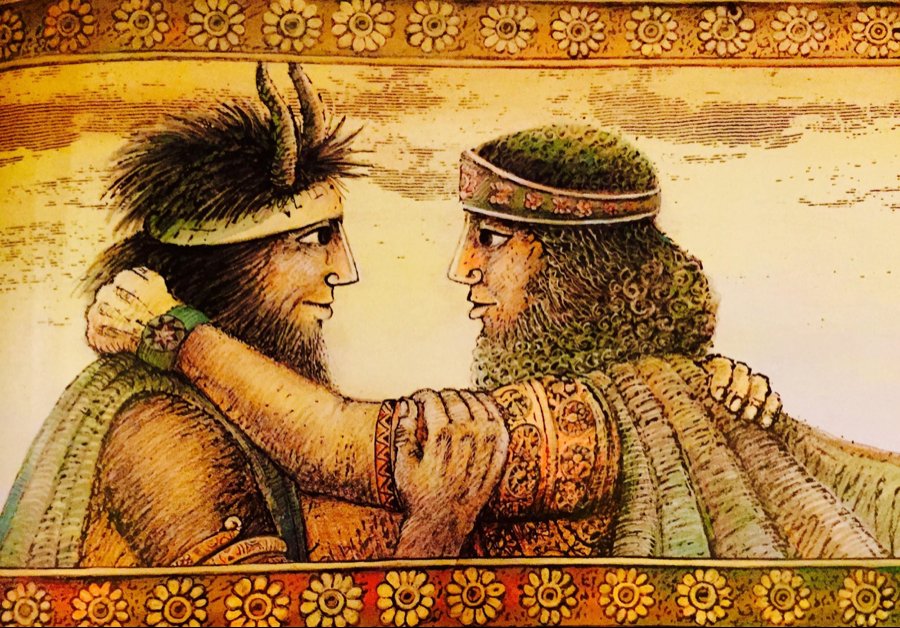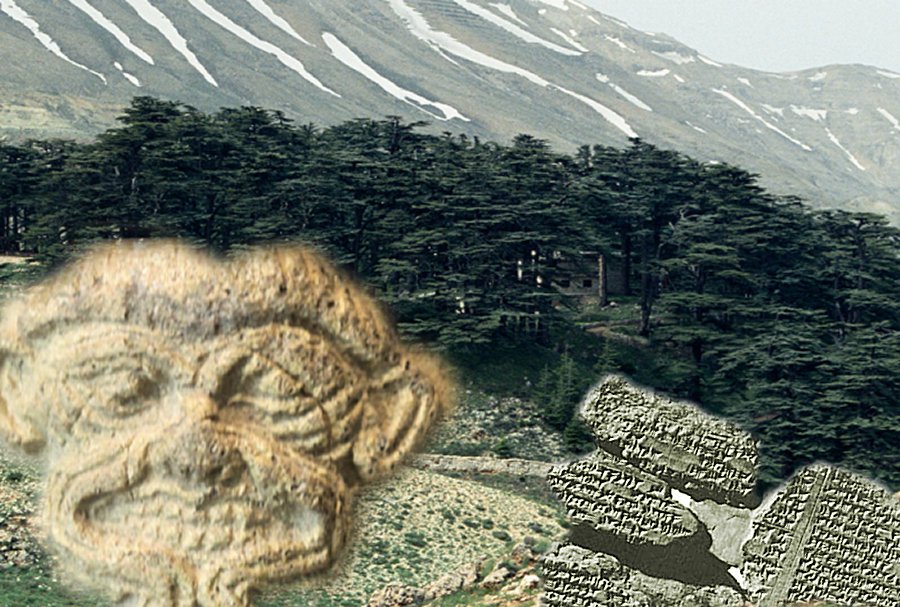Gilgamesh And Enkidu Undertake A Dangerous Mission To Hunt Forest Giant Humbaba
A. Sutherland - AncientPages.com - Mighty and robust bearded warrior Gilgamesh is remembered as semi-divine King of the Babylonian epic Gilgamesh. The greatest hero of Mesopotamia is believed to have built his great city of Uruk with his own hands.
The one-third human and two-thirds divine mythical figure has been depicted on countless reliefs and sculptures of Mesopotamia, as a bearded warrior, fighting monsters, bulls, and lions.
About 2100 BC, people began to create elaborate stories about Gilgamesh and his powerful deeds. Those earliest stories recorded in the Sumerian language were most probably only copies of very old, different tales praising Gilgamesh’s strength, achievements, and great courage. In this form, they were transmitted orally for centuries.
Most famous of all them is the great poem “Epic of Gilgamesh” in which Gilgamesh is a central figure.
“Epic of Gilgamesh” was written in Akkadian language about 1600 BC and its main, preserved version was recorded on twelve clay tablets by the Babylonian scholar and scribe, Sin-lege-unninni (means 'Sîn, the Moon God), 'one who accepts my prayer' who was working in the libraries of the city of Nineveh about 1100 BC.
Each tablet consists of six columns (three on the obverse and three on the reverse) of approximately 50 lines for each column, or a total of about 3600 lines.
In one story, Gilgamesh decided to visit the Cedar Forest in the Mountains, cut down cedar trees and bring back some to his people, but this adventure did not particularly appeal to his friend Enkidu because in the forest lives a terrible monster Ḫumbaba (in old Babylonian: Ḫuwawa ), the ruler of the forest.
“His utterance is fire. His breath is death. Why do you want to do this?" Enkidu asked Gilgamesh, adding that the great god Enlil had appointed Ḫumbaba as guardian of the forest to prevent mortals from entering the forest.
“It is an impossible challenge.” Enkidu warned.
Gilgamesh was still determined to pursue the monster because he had a great desire to be renowned so that he would not go to his grave unremembered.
With weapons and axes, the blessing of the sun god Utu and his seven brothers who would aid Gilgamesh in his quest, the hero called for men. Fifty men joined his company and they set off, all men with families stayed at home.
The journey was tiring and Gilgamesh was troubled by several ominous dreams. They passed through six mountain ranges; each time, Gilgamesh's intuition told him that it was not the place.
Finally, they reached the seventh, and Gilgamesh immediately knew where to find the cedars in this range. Unfortunately, it was also the domain of the forest guardian – the giant monster Ḫumbaba.
The giant had seven magics called “terrors” that he used against all who invaded his domain. His goal was to bite Gilgamesh and Enkidu through their necks and leave their bodies to the birds of prey.
Gilgamesh’s nerves almost failed him, he wanted to give up. The combat with Ḫumbaba – accompanied by a terrible, tremendous storm, while the land itself, was split apart - was furious and exhausting.
Enkidu wanted to help and he did it by encouraging his friend. “Don’t turn back! Make your blows fall harder!” In the end, lying at Gilgamesh’s feet, the giant Ḫumbaba was pleading for mercy and Gilgamesh took pity on him. Then once again, Enkidu warned his friend Gilgamesh that the giant was not to be trusted. There was only one solution: to kill Ḫumbaba and end his terror and so it happened.
Gilgamesh stabbed Ḫumbaba and Enkidu struck off his head and it was a great deed, but not everyone was impressed. They killed the guardian of the forest, who was appointed by god Enlil; they placed Ḫumbaba ’s head in a leather bag and returned to the temple of Enlil.
Both Gilgamesh and Enkidu would have caused them to regret their deed.
Enlil was furious and felt offended by them for what they had done. He took the seven magics (“terrors”) Gilgamesh tricked the monster into giving away and distributed them by giving to fields, rivers, reed beds, lions, palace, forests, and the goddess of prisoners, Nungal.
Instead of a divine reward, the two heroes expected, Enlil cursed them to wander over mountains and plains forever.
Written by – A. Sutherland AncientPages.com Staff Writer
Copyright © AncientPages.com All rights reserved. This material may not be published, broadcast, rewritten or redistributed in whole or part without the express written permission of AncientPages.com
Expand for referencesReferences:
Dalley S. Myths From Mesopotamia
Beckett, T. Sumerians
More From Ancient Pages
-
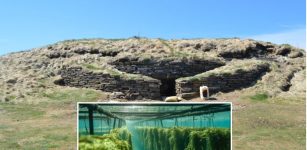 Ancient Europeans Ate Seaweed And Freshwater Plants – Evidence Found
Archaeology | Oct 17, 2023
Ancient Europeans Ate Seaweed And Freshwater Plants – Evidence Found
Archaeology | Oct 17, 2023 -
 The Phrase Hip Hip Hooray Has Ancient Roots
Ancient History Facts | Jun 6, 2018
The Phrase Hip Hip Hooray Has Ancient Roots
Ancient History Facts | Jun 6, 2018 -
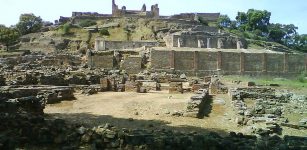 Immense Ancient Copper Mine Used By Romans Unearthed In Spain
Archaeology | Mar 20, 2017
Immense Ancient Copper Mine Used By Romans Unearthed In Spain
Archaeology | Mar 20, 2017 -
 Why Did Winter Baths Become So Popular?
Ancient History Facts | Jan 16, 2024
Why Did Winter Baths Become So Popular?
Ancient History Facts | Jan 16, 2024 -
 Extremely Rare Jurassic Fossils Discovered Near Lake Powell, Utah
Fossils | Oct 16, 2023
Extremely Rare Jurassic Fossils Discovered Near Lake Powell, Utah
Fossils | Oct 16, 2023 -
 On This Day In History: Napoleon Bonaparte Dies In Exile – On May 5, 1821
News | May 5, 2016
On This Day In History: Napoleon Bonaparte Dies In Exile – On May 5, 1821
News | May 5, 2016 -
 Mysterious Mythical Tree Connected To Strange Islands Found By Ancient Explorers
Featured Stories | Apr 13, 2024
Mysterious Mythical Tree Connected To Strange Islands Found By Ancient Explorers
Featured Stories | Apr 13, 2024 -
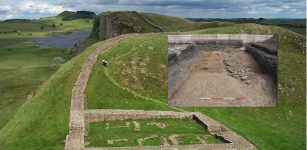 Fantastic Discovery At Hadrian’s Wall Reported By Archaeologists
Archaeology | Sep 10, 2022
Fantastic Discovery At Hadrian’s Wall Reported By Archaeologists
Archaeology | Sep 10, 2022 -
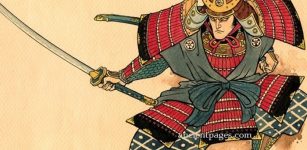 Everyday Life Of A Samurai: Armor, Appearance And Belongingness
Featured Stories | Nov 6, 2018
Everyday Life Of A Samurai: Armor, Appearance And Belongingness
Featured Stories | Nov 6, 2018 -
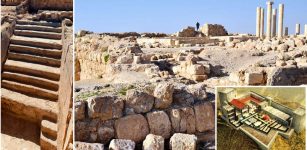 Ritual Bath In Herod’s Fortress Found In Ruins Of Machaerus, East Of Jordan River
Archaeology | Jun 16, 2017
Ritual Bath In Herod’s Fortress Found In Ruins Of Machaerus, East Of Jordan River
Archaeology | Jun 16, 2017 -
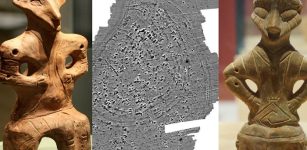 Huge Unknown 7,000-Year-Old Vinca Settlement Found In Serbia?
Archaeology | Apr 30, 2024
Huge Unknown 7,000-Year-Old Vinca Settlement Found In Serbia?
Archaeology | Apr 30, 2024 -
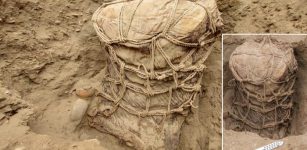 A 500-Year-Old Funerary Bundle And Pottery Probably Belonging To Ychsma Culture – Unearthed Near Lima, Peru
Archaeology | May 22, 2023
A 500-Year-Old Funerary Bundle And Pottery Probably Belonging To Ychsma Culture – Unearthed Near Lima, Peru
Archaeology | May 22, 2023 -
 Unique Geoglyphs In Torgay, Kazakhstan – Destroyed
Civilizations | Sep 5, 2015
Unique Geoglyphs In Torgay, Kazakhstan – Destroyed
Civilizations | Sep 5, 2015 -
 Why Have The Leibniz Keks 52 Teeth And Are Named After Philosopher Gottfried Wilhelm Leibniz?
Ancient History Facts | Mar 12, 2021
Why Have The Leibniz Keks 52 Teeth And Are Named After Philosopher Gottfried Wilhelm Leibniz?
Ancient History Facts | Mar 12, 2021 -
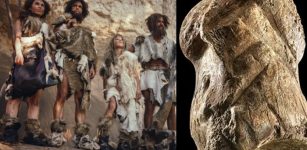 51,000-Year-Old Bone Carving Shows Neanderthals Were Artistic Long Before Humans Arrived
Archaeology | Jul 6, 2021
51,000-Year-Old Bone Carving Shows Neanderthals Were Artistic Long Before Humans Arrived
Archaeology | Jul 6, 2021 -
 Makhunik – 5,000-Year-Old City Of Dwarfs Who Hoped To Return One Day
Civilizations | May 28, 2014
Makhunik – 5,000-Year-Old City Of Dwarfs Who Hoped To Return One Day
Civilizations | May 28, 2014 -
 The Ebers Papyrus – Most Famous Plant Medicine ‘Encyclopedia’ Of Ancient Egypt
Civilizations | Feb 3, 2016
The Ebers Papyrus – Most Famous Plant Medicine ‘Encyclopedia’ Of Ancient Egypt
Civilizations | Feb 3, 2016 -
 Ambition, Greed And Death: The Roman Roots Of ‘Game Of Thrones’
Featured Stories | Jul 2, 2019
Ambition, Greed And Death: The Roman Roots Of ‘Game Of Thrones’
Featured Stories | Jul 2, 2019 -
 Remarkable And Unexplained Historical Sighting Reported By Multiple Witnesses In Wyoming
Featured Stories | Sep 26, 2024
Remarkable And Unexplained Historical Sighting Reported By Multiple Witnesses In Wyoming
Featured Stories | Sep 26, 2024 -
 Secrets Of The Assyrian Dream Book And Dream Interpretation In The Ancient Near East
Featured Stories | Aug 6, 2021
Secrets Of The Assyrian Dream Book And Dream Interpretation In The Ancient Near East
Featured Stories | Aug 6, 2021

